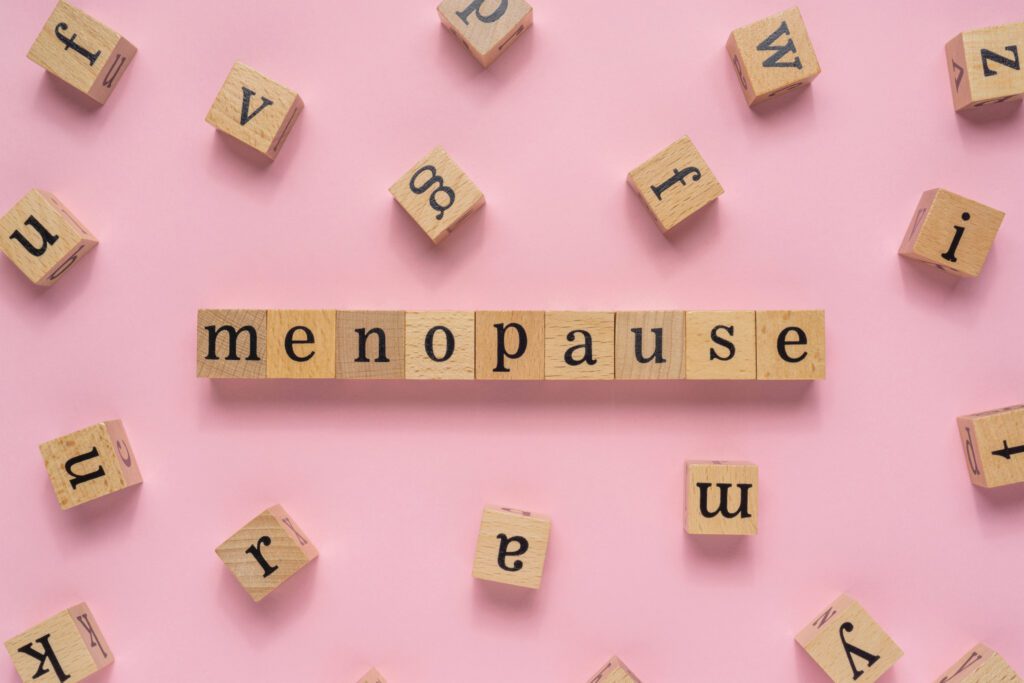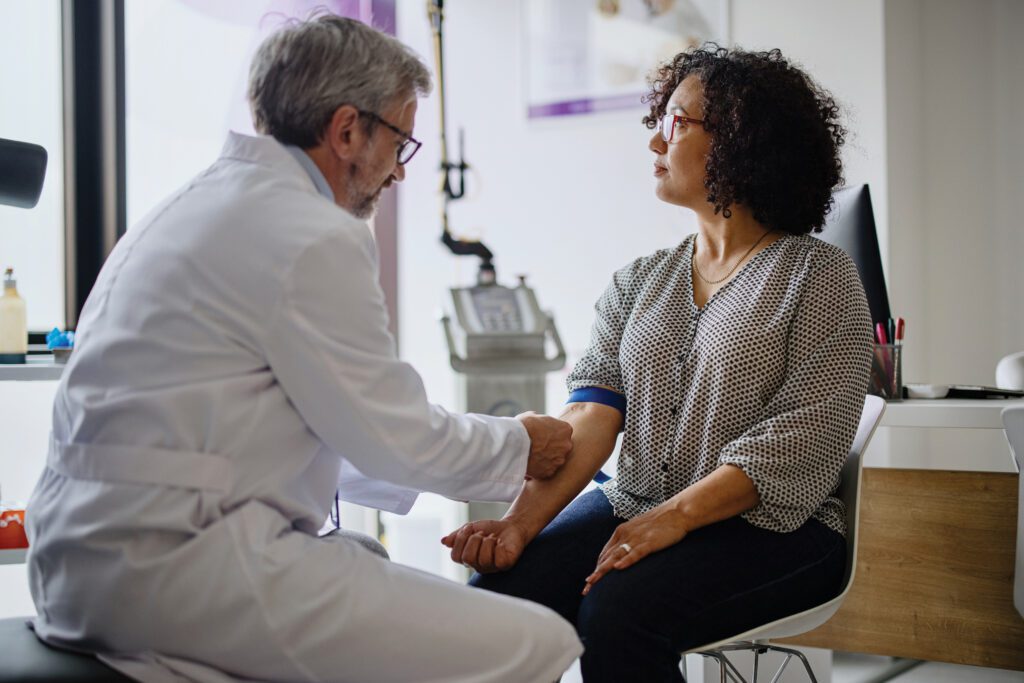Menopause. A transition many women approach with great trepidation. The hot flashes, the mood swings, and the unwelcome reminder that you’re getting older. While healthy and natural, it certainly isn’t always what you’d call pleasant. But with all the urban myths and horror stories out there, it’s time to dispel uncertainty and take back the m-word.
What is Menopause, Exactly?

More than 6,000 women a day hit menopause, but what exactly is it? According to the North American Menopause Society, menopause is defined as a woman’s final menstrual period. It is typically confirmed retroactively, when a woman has missed her period for 12 consecutive months. At this point, the ovaries have stopped producing reproductive hormones. Dr. Shevonda Sherrow, an OB-GYN with Innovative Women’s Health Specialists, clarifies that the ovaries don’t cease hormone production altogether. “Menstruation stops because the ovaries stop making estradiol, a form of estrogen necessary for reproduction.They continuetomakethe hormones needed to support the heart, the brain, and other important functions.”
On average, menopause occurs around age 51, but can occur as early as 40 and as late as 60. Early menopause is less common, and can often point to a specific cause. According to Dr. Matthew Roberts, an OB-GYN with Associates in Women’s Health, “The most common reason a woman may experience menopause early is surgical menopause when, for some medical reason, she has her ovaries removed. Other reasons may include thyroid disorders, Addison’s disease
(a disorder in which the adrenal glands don’t produce enough hormones), genetic disorders such as Down syndrome (a chromosonal disorder causing developmental and intellectual delays) and Turner syndrome (a female chromosomal disorder), radiation, or chemotherapy.” Genetics also play a role in the onset of menopause. Remember how your mom and sister both started at age 50? Yep, you can expect a similar trajectory!
The Stages Surrounding Menopause
Though commonly grouped together under the umbrella term of “menopause,” there are two other stages, each with its own associated bodily changes that help signal the ceasing of menstruation.
“Perimenopause describes the two to five years when ovarian function gradually declines before complete menopause,” says Dr. David Barker, an OB-GYN with the Centre of Excellence at Parkridge Medical Center. “Women in perimenopause often experience cycle irregularity, episodic hot flashes, and some mood and sleep disturbances.” During this phase, levels of estrogen and progesterone begin to drop. However, it’s important to note that, though hormone levels are decreasing during this stage, pregnancy is still very much possible. Perimenopause can be difficult to identify sometimes, so if you think that you are in the menopausal transition, a physical exam with your gynecologist can provide the answers you’re seeking.
Postmenopause, on the other hand, begins one full year after your last period. While there is no reliable way to predict when menopausal symptoms will subside, many women experience relief two to five years postmenopause. Any bleeding or spotting during this time is not typical and should be checked by a doctor.
Unfortunately, the lower hormone levels women experience postmenopause can put them at an increased risk for health problems like osteoporosis and heart disease, so it’s important to make diet and lifestyle improvements to decrease the risks.
More Than Just Hot Flashes
While everyone associates menopause with hot flashes, those aren’t the only pesky visitors knocking at your door during the transition.
Vaginal dryness and urinary problems are also common symptoms of menopause. Changing estrogen levels can cause your genital area to become drier and thinner, leaving you more susceptible to infection as well as possible discomfort during intercourse.
Women also report bouts of insomnia during the menopausal transition period. They may be caused by hot flashes or night sweats and can leave ladies feeling irritable. After all, no one’s at their best on little sleep.
If mood swings were common for you before your monthly period or you experienced depression after giving birth, chances are you will experience mood changes during the menopausal process too. They’re generally related to stress, tiredness, or changes in family life. If your changes in mood are more severe, consult with your doctor.
Other changes associated with menopause, like having trouble focusing or weight gain, could be attributed to a combination of changing hormone levels and simply getting older. The good news is that there are ways to make your transition a bit easier.
Menopausal Myth
Just because you’re no longer ovulating, it doesn’t mean you can skip out on your regular gynecological visits. Dr. Sherrow notes, “When women go through menopause, whether it’s physical or surgical, many tend to think they don’t need to go to the gynecologist anymore. That’s not true. There are still other things happening with your body that we need to be aware of.”
Tips for Tackling the Transition


While menopause is unavoidable, there are ways to treat many of the symptoms and keep you feeling your best.
Stay active.
“Exercise during menopause can have a range of benefits, including the prevention of weight gain, reducing cancer risks, strengthening bones, and boosting general mood,” says Dr. Roberts. Women should aim to complete around two and a half hours per week of moderate exercise or 75 minutes of vigorous exercise per week, and should consider adding strength training and stretching exercises to their routine.
Dress in layers.
Since hot flashes are to be expected with hormone fluctuation, layering your clothes can help ease the episodes and keep you comfortable.
Avoid triggers.
Pay attention to foods that might trigger hot flashes. Spicy foods, caffeine, and sugary foods can all make hot flashes worse.
Eliminate unhealthy habits.
Habits like smoking can exacerbate already uncomfortable symptoms of menopause. Quitting should alleviate some of the aggravated symptoms.
Consider medication.
If lifestyle changes alone don’t mitigate discomfort, your doctor may be able to prescribe medication to ease symptoms like vaginal dryness, hot flashes, or sleep issues. “The serotonin in our brains helps regulate our temperature, so anti-depressants can be prescribed to help decrease the intensity and frequency of hot flashes,” says Dr. Sherrow.
Talk to your doctor about hormone replacement therapy.
Menopause lowers hormone levels, which is the primary reason you experience symptoms. “Hormone replacement consistently relieves menopausal symptoms in most women. However, it is an important topic for a woman to discuss with her doctor to ensure it is appropriate for her,” says Dr. Barker.
Staying educated on what to expect, living a healthy lifestyle, and having regular check-ups with your doctor can help you prepare for the process and own your experience. After all, like Dr. Roberts says, “Menopause is a phase of life, not a disease.”


John Doe
Obstetrician and Gynecologist, Associates in Women’s Health


Dr. David Barker
Obstetrician and Gynecologist, OBGYN Centre of Excellence at Parkridge Medical Center


Dr. Shevonda Sherrow
Obstetrician and Gynecologist, Innovative Women’s Health Specialists

